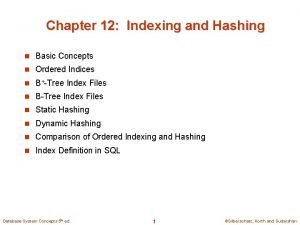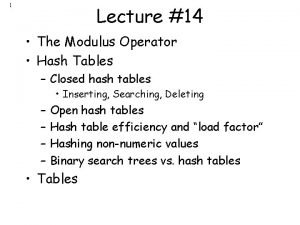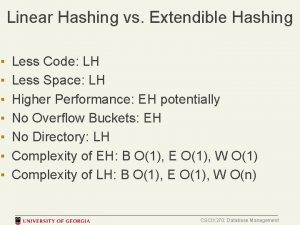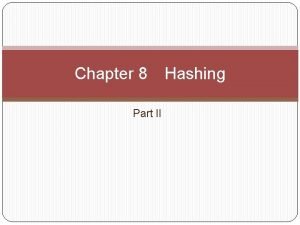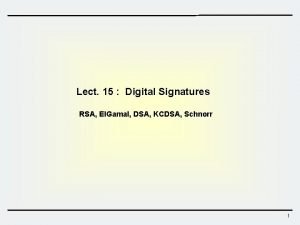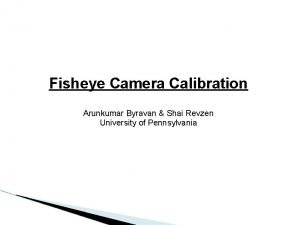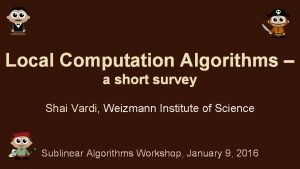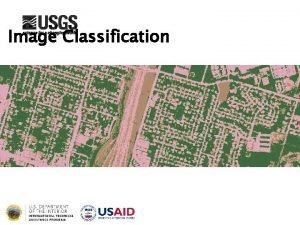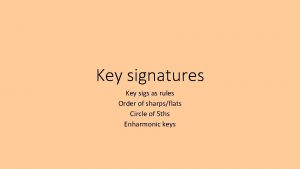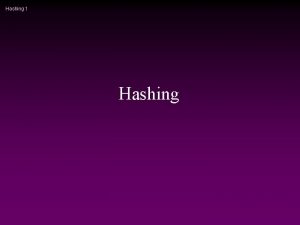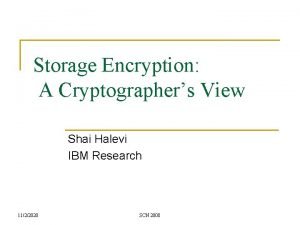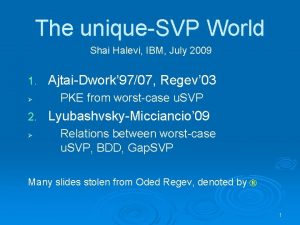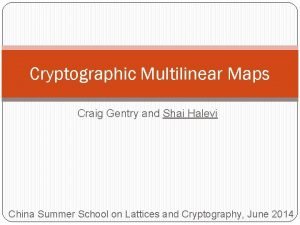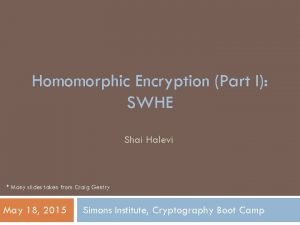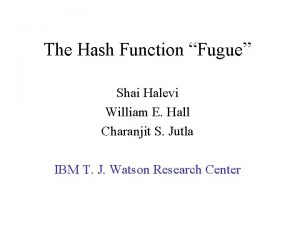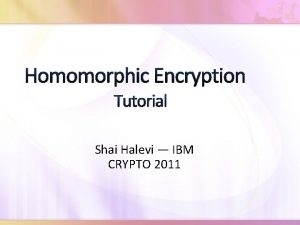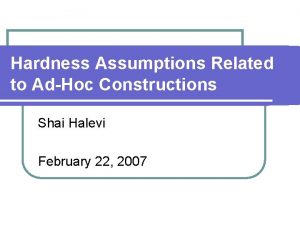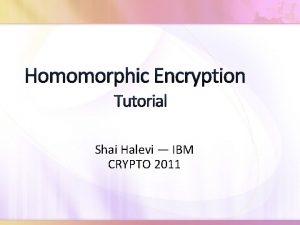Strengthening Digital Signatures via Randomized Hashing Shai Halevi













- Slides: 13

Strengthening Digital Signatures via Randomized Hashing Shai Halevi and Hugo Krawczyk IBM Research 1

Coping with Collisions n Post-Wang Trauma (collision attacks): ¨ A healthy reminder of our “shaky foundations” n Applications threatened by collisions: mainly signatures n What to do: avoid patches, build stronger hash funct’s ¨ But do we know how? n Our approach: “Hope for the Best, Plan for the Worst” n BUILD APPLICATIONS ON AS WEAK AS POSSIBLE ASSUMPTIONS ON THE UNDERLYING HASH FUNCTIONS 2

Our Contribution We randomize the signature processing such that: n n n Signatures remain secure even if off-line collision attacks against hash are successful Attacker needs to be able to mount a variant of the much harder “second-preimage attack” (on compr. f. ) Off-line attacks useless: Per-signature attack (on line!) ¨ n Attack can start only when per-signature randomness revealed HASH FUNCTION AND SIGNING ALG UNCHANGED!! 3

Too Good To Be True? n Simple message randomization scheme n Provable reduction to “second preimage resistance” n NIST: SP 800 -106 ! ¨ Internet Draft is coming (see our website) 4

RMX: Message Randomization Scheme n From SIGN( Hash( M ) ) to SIGN( Hash( RMX(r, M) )) n RMX(r, M) : M=(m 1, m 2, …, m. L), r (r, m 1 r, m 2 r, …, m. L r) n In signatures: M=(m 1, m 2, …, m. L), mi and r of block r length H(r, m 1 r, m 2 r, …, m. L r) (eg 512) r chosen by signer at random w/each sig . . SIGN, r Input to signing algorithm (r transmitted with sig) 5

RMX: Preserving Hash-then-Sign M =(m 1, …, m. L) RMX r (r, m 1 r, , …, m. L r) HASH SIGN 6

m 1 Merkle. Damgard. IV Hash H m 2 h r (one-pass blockwise processing) IV h h m. L h ● ● ● m 1 r The RMX Scheme m. L-1 r h ● ● ● h Hash(M) m. L r h h ~ H(r, M) 7

Practical ¨ RMX: simple front-end to existing hash-then-sign modules ¨ No change to hash functions or signature algorithms ¨ Compatible with block-wise processing of M-D functions ¨ Random generation by signer only n (e. g. , certificate issuing vs verifying) 128 bits of randomness (up to a block, 512) Transporting r: application-dependent (like IV in CBC); E. g. , X. 509: r as a parameter under Algorithm. Identifier Implementations: certificate signing (openssl, NSS/Firefox[B&S]) XML: next (note: RMX can be applied to multilevel signing) Documented by NIST: SP 800 -106 (Internet Draft coming) 8

Secure n Substantial security increase for digital signatures ¨ A fundamental shift in attack scenario: Off-line vs. On-line n ¨ n In particular: no inherent birthday, shorter outputs (truncation) A much harder cryptanalytical task (~SPR of compression function) Notes ¨ Randomization never weakens: A SAFETY NET ¨ Likely extension of useful life of hash functions, may prevent or mitigate catastrophic failure, more planning time upon weaknesses ¨ Much like HMAC for MAC functions (btw, is HMAC good as RMX? ) 9

http: //www. ee. technion. ac. il/~hugo/rhash/ n Paper (Crypto’ 06) n Implementation experience n Internet Draft 10

Randomized Hashing Implementation n Java JCE Provider for java. security. Signature ¨ n No set. Param for java. security. Message. Digest Apache XML Security library extensions ¨ Signature n ¨ Salt parameter passed as child of Signature. Method Transform n Salt parameter passed as child of Transform 13

XML Signature Example <Test><Data>Test Data</Data><ds: Signature xmlns: ds="http: //www. w 3. org/2000/09/xmldsig#"> <ds: Signed. Info><ds: Canonicalization. Method Algorithm="http: //www. w 3. org/TR/2001/REC-xml-c 14 n-20010315"></ds: Canonicalization. Method> <ds: Signature. Method Algorithm="http: //www. research. ibm. com/rmx/xmldsig#rmx-rsa-sha 1"> <Salt xmlns="http: //www. research. ibm. com/rmx/xmldsig">JYo. VX 6 Pqdc/z/1 k…</Salt></ds: Signature. Method> <ds: Reference URI=""> <ds: Transforms> <ds: Transform Algorithm="http: //www. w 3. org/2000/09/xmldsig#enveloped-signature"></ds: Transform> <ds: Transform Algorithm="http: //www. w 3. org/TR/2001/REC-xml-c 14 n-20010315#With. Comments"></ds: Transform> <ds: Transform Algorithm="http: //www. research. ibm. com/rmx/xmldsig#rmx-sha 1"> <Salt xmlns="http: //www. research. ibm. com/rmx/xmldsig">d. S 1 m. E 6 FG 5 Iikiz. QEJKafg 6 k. VChc=</Salt> </ds: Transform></ds: Transforms> <ds: Digest. Method Algorithm="http: //www. w 3. org/2000/09/xmldsig#sha 1"></ds: Digest. Method> <ds: Digest. Value>x. E/1 o. Rdq+7 z 3 KDAj 9 qh/GY/6 SWQ=</ds: Digest. Value> </ds: Reference></ds: Signed. Info> <ds: Signature. Value>f. DDeknd. St. Uhk 8 wvf. PJNe 8 pj 0 T 2 ZHPx 4 ZJ 06 s 4 k. Oh. Sv. Yuc. QCy. NKUQr. Ad. SQds…</ds: Signature. Value> <ds: Key. Info><ds: Key. Value><ds: RSAKey. Value> <ds: Modulus>heaz. CYHw. ZC 5 ki. GI 6 e. O 3 ZSLjypfdge. Xu 3 u. XJo. N/VYl. Wr. P 51 No. J 5 w. R 9 NOnz. Ax. Chuf. T 5 qi 0…</ds: Modulus> <ds: Exponent>AQAB</ds: Exponent></ds: RSAKey. Value></ds: Key. Info></ds: Signature> </Test> 14

Adding Support for New Signature. Method or Digest. Method n Adding new JCE Signature Provider ¨ Add one class derived from base; specify: n n n Underlying Signature Provider (e. g. DSA) Associated Message. Digest block size (e. g. SHA 1 = 20 bytes, MD 5 = 16 bytes, etc. ) Adding new Transform ¨ Add one class derived from base; specify: n Underlying Message. Digest Provider 15
 Somewhat homomorphic encryption
Somewhat homomorphic encryption Static and dynamic hashing in dbms
Static and dynamic hashing in dbms What is open hashing and closed hashing
What is open hashing and closed hashing Distinguish between extendible and linear hashing
Distinguish between extendible and linear hashing Motivation for dynamic hashing
Motivation for dynamic hashing Digital signature
Digital signature Clara ho tung
Clara ho tung Plumb bob distortion model
Plumb bob distortion model Shai vardi
Shai vardi Coptic alphabet ti
Coptic alphabet ti Minimum distance classifier
Minimum distance classifier Order of sharos
Order of sharos Compact multi-signatures for smaller blockchains
Compact multi-signatures for smaller blockchains Uncitral model law on electronic signatures
Uncitral model law on electronic signatures

